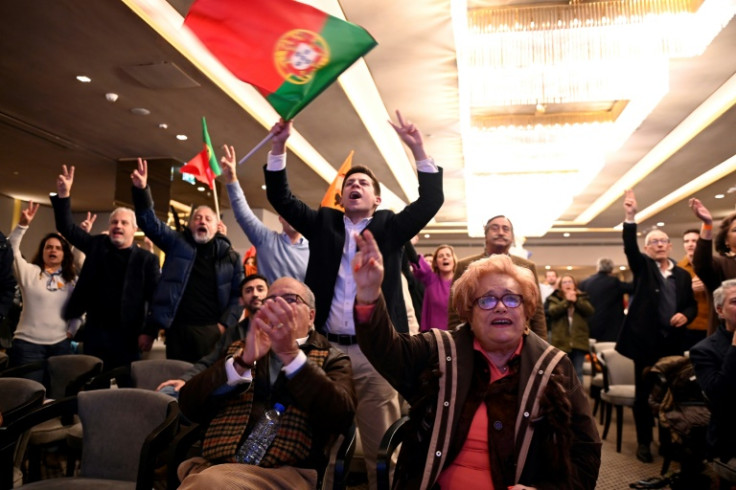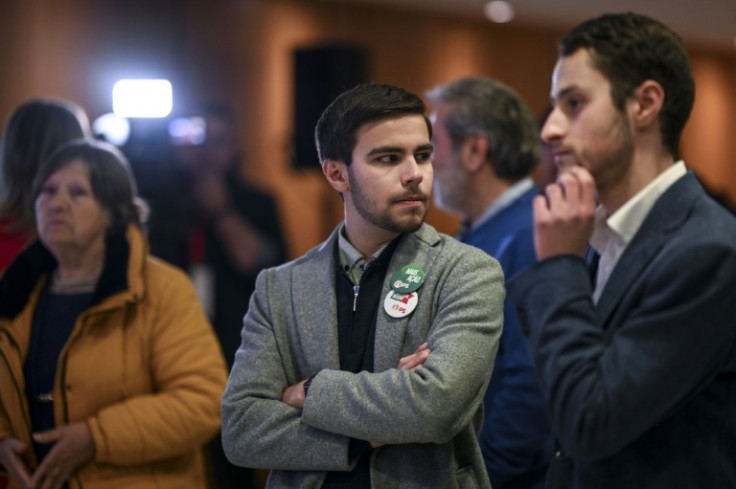Portugal Swings To The Right In Election Marked By Far-right Surge

Portugal's opposition centre-right party won Sunday's general election while support for populist far-right Chega surged making it a kingmaker in the new parliament, an exit poll indicated.
The centre-right Democratic Alliance (AD) is expected to win 83 to 91 seats in the 230-seat parliament, the poll for public television RTP showed. That compares to the 69 to 77 seats for the Socialists who have ruled since 2015.
Chega is on track to win 40 to 46 seats, up from just 12, making it a kingmaker in the new parliament.
The new business-friendly Liberal Initiative party got seven to 10 seats, giving the right a clear majority in parliament.
The Democratic Alliance had campaigned on promises to boost economic growth by cutting taxes, and to improve unreliable public health services and education which have been hit by strikes by teachers and school workers over pay.
"We really must turn the page," the party's leader, 51-year-old lawyer Luis Montenegro, told a packed final rally at Lisbon's bullring on Friday night.
While he has steadfastly ruled out any post-election agreement with Chega, other top party officials have been more ambivalent.
Chega has said it would insist on being part of a rightist coalition government in exchange for parliamentary support, and analysts say a deal with the anti-establishment party may prove the only way for the AD to govern.
"We want to give Portugal a stable government," Ventura said after the exit poll was released. "We are available to build a government in Portugal."
He described the projected results for his party as "absolutely historical".
The exit poll for RTP was carried out by Portugal's Catholic University, which in previous elections has proved largely accurate.
Like other populist far-right parties in Europe, Chega has tapped into concerns about crime and rising immigration.
With one of Europe's most open immigration regimes, Portugal has seen its foreign-born population double in five years and hit one million last year -- one-tenth of the country's population.
Chega, which means "Enough", calls for stricter controls over immigration, tougher measures to fight corruption and chemical castration for some sex offenders.
Chega leader Andre Ventura -- a former trainee priest who went on to become a television football commentator - had called for a high turnout, arguing the election was important because Portugal was "going through deep demographic and social changes".
Just five years old, Chega picked up its first seat in Portugal's 230-seat parliament in 2019. It was the first far-right party to win representation in the assembly since a military coup in 1974 toppled a decades-long right-wing dictatorship.
Its rise mirror gains by far-right parties across Europe, where they already govern -- often in coalition -- in countries such as Italy, Hungary and Slovakia, or are steadily gaining, as in France and Germany.
The election was called after Socialist Prime Minister Antonio Costa, 62, unexpectedly resigned in November following an influence-peddling probe that involved a search of his official residence and the arrest of his chief of staff.
Though Costa himself was not accused of any crime, he decided not to run again.
On his watch unemployment has dropped, the economy expanded by 2.3 percent last year -- one of the fastest rates in the eurozone -- and public finances have improved.
But surveys indicate many voters feel Costa's government squandered the outright majority it won in 2022 by failing to improve public services or to address a housing crisis which has sparked large street protests in what remains one of Western Europe's poorest countries.
The Socialists' new leader, 46-year-old former infrastructure minister Pedro Nuno Santos, had argued the Socialist party was a "safe harbour".
He warned that the right would have to slash pensions and other social spending to finance its promised tax cuts.



© Copyright AFP 2024. All rights reserved.











